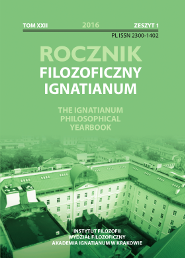Using prevention and resocialization to foster personal development towards the highest values in cases of social pathology
Abstract
This article examines the topic of approaches to personal development that aim at achieving the highest possible level. Such approaches are considered here in the context of Kazimierz Dąbrowski “Theory of Positive Disintegration” (TPD). The shaping of the personality is accomplished by the dynamic integration and disintegration of the individual, and also by considering his/her five levels of development. The first level is called the stage of primary integration, whilst harmonious secondary integration refers to the highest level of development itself. The discovery of the highest level of personal value in one’s progress is one of the most effective stages in protecting the individual from any unacceptable moral or ethical standards present in society. It is also effective in the resocialisation of cases involving social pathology. Each person has the task of promoting their personal values to the highest level of development. When the individual conclusively fulfils this task, he/she reaches an optimal stage of harmoniousness and peacefulness.References
Aleksandrowicz J (1988), "Sumienie ekologiczne" Wiedza Powszechna.
Cekiera C (1991), "Rozwój osoby w warunkach stresu psychologicznego", In Człowiek w sytuacji trudnej. , pp. 60-66. Polskie Towarzystwo Higieny Psychicznej.
Cekiera C (2014), "Człowiek w świecie uzależnień", In Myśleć o społeczeństwie: Teoria i praktyka w pedagogicznym i społecznym działaniu. , pp. 1-24. Wydawnictwo Naukowe Wyższej Szkoły Biznesu.
Cekiera C (2013), "Papierosy: palący problem palenia" Europejskie Centrum Edukacyjne.
Cekiera C (2011), "W obronie życia i zdrowia" Wydawnictwo Niepaństwowej Wyższej Szkoły Pedagogicznej.
Cekiera C (1999), "Psychoprofilaktyka uzależnień oraz terapia i resocjalizacja osób uzależnionych" Towarzystwo Naukowe KUL.
Cekiera C (1994), "Ryzyko uzależnień" Towarzystwo Naukowe KUL.
Cekiera C (1993), "Rozwój ku wyższym wartościom profilaktyką uzależnień" Ośrodek Apostolstwa Trzeźwości.
Dąbrowski K (1989), "Elementy filozofii rozwoju" Polskie Towarzystwo Higieny Psychicznej.
Dąbrowski K (1986), "Trud istnienia" Wiedza Powszechna.
Dąbrowski K (1982), "Pasja rozwoju" Polskie Towarzystwo Higieny Psychicznej.
Dąbrowski K (1979), "Psychoterapia przez rozwój" Polskie Towarzystwo Higieny Psychicznej.
Dąbrowski K (1975), "Osobowość i jej kształtowanie poprzez dezintegrację pozytywną" Polskie Towarzystwo Higieny Psychicznej.
Frankl VE (1984), "Homo patiens" Instytut Wydawniczy PAX.
Granat W (1985), "Personalizm chrześcijański: Teologia osoby ludzkiej" Księgarnia św. Wojciecha.
Grzywak-Kaczyńska M (1988), "Trud rozwoju" Instytut Wydawniczy PAX.
Horney K (1976), "Neurotyczna osobowość naszych czasów" PWN.
Jan Paweł II (1991), "Centesimus Annus (1991)" Wrocławska Księgarnia Archidiecezjalna TUM.
Jan Paweł II (1982), "Redemptor hominis (1979)" Instytut Wydawniczy Pax.
Jan XXIII (1963), "Pacem in Terris (1963)" Société d'Educations Internationales.
Jędrzejko M (2003), "Człowiek zniewolony: Moralne aspekty narkomanii" Agencja Wydawnicza Ulmak.
Lubański M (1990), "Człowiek istotą moralną", In System wartości i zdrowie psychiczne. , pp. 38-47. Uniwersytet Warszawski, Polskie Towarzystwo Higieny Psychicznej.
Osińska K (1990), "Zdrowie psychiczne człowieka cierpiącego", In System wartości i zdrowie psychiczne. , pp. 62-67. Uniwersytet Warszawski, Polskie Towarzystwo Higieny Psychicznej.
Pierzchała K and Cekiera C (2009), "Człowiek a patologie społeczne" Wydawnictwo Adam Marszałek.
Popielski K (1993), "Noetyczny wymiar osobowości: Psychologiczna analiza poczucia sensu życia" Redakcja Wydawnictw KUL.
Płużek Z (1982), "Problemy psychologiczne suicydologii" (39(11)), pp. 14-43.
Ślipko T (1970), "Godność osoby ludzkiej" (74(2)), pp. 185-195.
Wyszyński S (), "Sumienie prawe u podstaw odnowy życia narodowego"
(1991), "Człowiek w sytuacji trudnej" Polskie Towarzystwo Higieny Psychicznej.
(1987), "Człowiek - pytanie otwarte. Studia z logoteorii i logoterapii" Katolicki Uniwersytet Lubelski.
The Yearbook only accepts materials for publication that are free of all conflicts of interest, and that in no way involve conflicts over authorship, copyright, etc. The Editors will take action against any cases of plagiarizing, ghostwriting1, guest/honorary authorship2, etc. Where co-authored work is concerned, the Author listed first is expected to take responsibility for the submission, and is required to make clear the contributions of all of the Co-Authors involved. In the event of the publication owing its existence to funding dedicated to this purpose, this fact should be made clear: e.g. in any note of thanks/acknowledgement, or in a footnote, etc. Explicit notification should be given of any form of reprinting, with the appropriate evidence of permission to publish being furnished as required. Any impropriety on the part of Authors/Reviewers risks exposing them to appropriate responses from the relevant institutions.
______
1 This term refers to instances of a person who has made an essential contribution being omitted from the list of authors, or from notes conveying gratitude and/or acknowledgement.
2 This occurs when a person who has made either an insignificant contribution or no contribution at all nevertheless appears on the list of authors.





